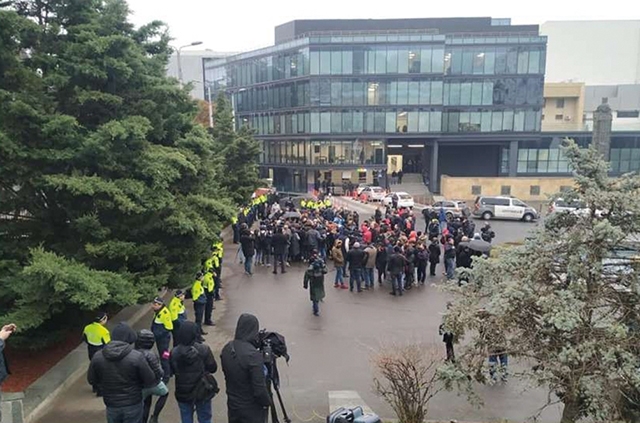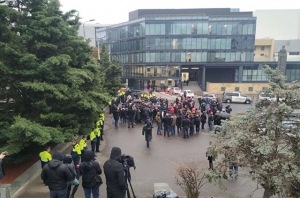Election Protests, ‘Padlock Days’ Continue in Georgia
Following the November 18 rally dispersal in front of Parliament, the political situation remains tense throughout the country.
A few tents remain in front of the parliament building on the central Rustaveli Avenue in Tbilisi, in which activists spend their nights.
Demonstrations are held every day at different locations throughout the capital. Opposition representatives and civil activists have taken to expressing their protest by padlocking various governmental buildings, such as the Prosecutor General’s Office and the Government Administration, claiming that the “padlock symbolizes the fact that these Offices are no longer functioning.”
On November 20, protesters padlocked the gate of the General Prosecutor's Office while holding a rally outside the building. They initially planned to padlock the building door shut but were prevented from doing so but law enforcers.
Yet another demonstration took place on November 21, during which opposition members and activists symbolically put a padlock on the fence of the government administration building. Police prevented the protesters from padlocking the main entrance, resulting in clashes and the promise from the demonstrators that the picketing would continue.
Also this week, several demonstrators detained during the November 18 rally dispersal in central Tbilisi were sent to administrative detention for ‘hooliganism and disobeying police.’ The trials were held on November 20.
The Tbilisi City Court found Irakli Nadiradze, member of City Council, Giga Makarashvili, one of the organizers of the protest rally, and three other detainees, Dimitri Bidzinashvili, Davit Mzhavanadze and Irakli Kacharava, guilty of violating the law. Another detainee, Paata Sosanashvili, was given a verbal warning.
The judge sentenced Nadiradze to administrative imprisonment of 13 days, Makarashvili to 12 days, Bidzinashvili to 13 days, and Mzhavanadze and Kacharava to four days each.
Those injured in the rally, three demonstrators and two law enforcers, have already been discharged from hospital.
The opposition announced that demonstrations will continue until their demands are met. Another mass protest rally is planned for November 25 in Tbilisi and there are plans to block the parliament building on November 26.
Gigi Ugulava, a member of the European Georgia party, stated that they will protest and arrange a ‘Padlock Day’ in front of the government administration each Thursday.
“If Parliament is blocked, the government will respond appropriately,” Tbilisi Mayor Kakha Kaladze warned in response, noting that the protesters should not go beyond the law.
“No one will prevent the rallies. People have the right to express their opinions on any issue, no matter how critical it may be. However, most importantly, they should not go beyond the law. Of course, no-one can prevent these people from coming out and expressing their views, but if the Parliament is blocked, the relevant services will respond appropriately,” he said.
The protests in Tbilisi were sparked after the rejection of an election bill last week, proposed by the ruling Georgian Dream party, offering the transition to a fully proportional electoral system from 2020 instead of 2024.
The demonstrators accuse the current state leadership of "breaking its promise and cheating people" as the ruling party agreed to conduct the 2020 parliamentary elections using a fully proportional electoral system, during the internationally renowned June protests in Tbilisi. Protesters demand a second hearing in Parliament regarding the proportional elections, and some are pushing for snap elections.
By Ana Dumbadze












